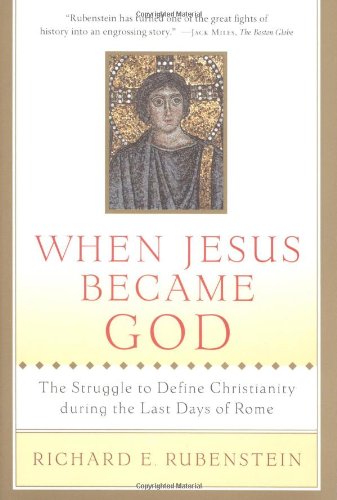Book review: When Jesus Became God
by Richard E. Rubenstein
★★★★
After nearlythree hundred years of persecution, Christianity made a breakthrough in 324, when Constantine became emperor of Rome. Led by two charismatic priests—Arius, who preached that Jesus is subject to God, and Athanasius who argued that Jesus is God himself in human form—the debate over Jesus’ degree of divinity escalated from heated argument to violence and bloodshed. Rubenstein guides you through the power struggles of the time, concluding in the year 381, when the Council of Constantinople affirmed that Jesus Christ was…
the only-begotten Son of God, begotten from the Father before all ages, light from light, true God from true God, begotten not made, homoousios with the Father, through Whom all things came into existence.
Theodosius left no doubt about the church’s official stance by demanding,
We now order that all churches are to be handed over to the bishops who profess Father, Son and Holy Spirit of a single majesty, of the same glory, of one splendor, who establish no difference by sacrilegious separation, but [who affirm] the order of the Trinity by recognizing the Persons and uniting the Godhead.
Arianism was officially denounced, and possession of Arian writings would become crimes punishable by death. Jesus Christ was pronounced God. This book is the story of how Christianity reached this conclusion.












 354 Circles
354 Circles
 603 Goodreads Friends & Fans
603 Goodreads Friends & Fans

 Hello! I'm an author, historical Jesus scholar, book reviewer, and liberal Christian, which means I appreciate and attempt to exercise the humanitarian teachings of Jesus without getting hung up on any particular supernatural or religious beliefs.
The Bible is a magnificent book that has inspired and spiritually fed generations for thousands of years, and each new century seems to bring a deeper understanding of life’s purpose. This is true of not only Christianity; through the years, our age-old religions are slowly transforming from superstitious rituals into humanitarian philosophies. In short, we are growing up, and I am thrilled to be riding the wave.
I avidly read all thought-provoking religion titles. New authors: I'd love to read and review your book!
Hello! I'm an author, historical Jesus scholar, book reviewer, and liberal Christian, which means I appreciate and attempt to exercise the humanitarian teachings of Jesus without getting hung up on any particular supernatural or religious beliefs.
The Bible is a magnificent book that has inspired and spiritually fed generations for thousands of years, and each new century seems to bring a deeper understanding of life’s purpose. This is true of not only Christianity; through the years, our age-old religions are slowly transforming from superstitious rituals into humanitarian philosophies. In short, we are growing up, and I am thrilled to be riding the wave.
I avidly read all thought-provoking religion titles. New authors: I'd love to read and review your book!
 Hi! While Lee writes the articles and reviews the books, I edit, organize, and maintain the blog. The views expressed here are Lee's but I'm his biggest supporter! :-)
Hi! While Lee writes the articles and reviews the books, I edit, organize, and maintain the blog. The views expressed here are Lee's but I'm his biggest supporter! :-)
It is unfortunate that the error of “how Christianity reached this conclusion”, is still continued. It was a Catholic conclusion. Why did one group win over another? I wonder if the book goes into the politics of the choice? It seems that before that time at least one emperor was against the choice.